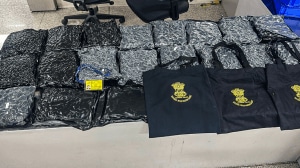To attain greater flexibility to offer farm support, India is in the process of pushing for a permanent solution at the upcoming inter-ministerial summit at Abu Dhabi from February 26 to 29 but a deadlock over the politically charged issues between developed and developing countries is unlikely to see a resolution.

The Cairns Group – comprising Australia, Brazil and Canada among others members — have claimed that India’s public stockholding (PSH) programme is highly subsidised and the farm support that India gives is “distorting” global food prices and “hurting” food security of other countries.
Story continues below this ad
Last year in November, the circulated a detailed proposal to slash trade-distorting farm support in WTO members, halving the total global entitlement to subsidize. This triggered tensions among developing nations including India. While India’s per farmer subsidy is abysmally low compared to what countries such as the US offer, the WTO rules do not consider subsidies on a per-farmer basis, thereby being heavily loaded against developing countries.
Abhijit Das, expert on international trade and the former head, Centre for WTO Studies said that the Cairns Group is trying to get India to “dismantle” the MSP scheme or “reduce its scope” and that is the reason India is fighting to get better legal protection for its MSP programme.
Notably, India cannot be dragged into a dispute over its subsidies as it is protected by the ‘Peace Clause’ that was agreed by the WTO members during the Bali ministerial in 2013. But due to some of the provisions in the clause being ambiguous, India is open to face disputes.
“WTO norms don’t restrict us from providing high MSP. Because of the peace clause there is no restriction on what should be the level of MSP or the level of procurement. But there is no 100% legal certainty. We are questioned at WTO and that is why we are trying to seek a permanent solution,” Das said.
Story continues below this ad
Das explained that farmers groups have stated that agriculture should be taken out of WTO but that approach could pose problems and would restrict India and other developing nations from disciplining the subsidies being given by the developed world.
“Our per farmer subsidy is abysmally low compared to what the US gives. But the WTO rules, unfortunately, are not on the basis of per farmer subsidy. If new schemes are to be implemented, then for those products we will have to comply with the 10% subsidy ceiling and they will not be protected under the ‘Peace Clause’,” he added.
This means that if the government were to agree to farmers demands for an MSP law, it will not be covered under the peace clause that gives India protection from legal disputes at the WTO.
As part of its demand for a permanent solution at the upcoming ministerial meeting in Abu Dhabi, India has not only pushed for measures to amend the formula to calculate the food subsidy cap but also to include programmes implemented after 2013 under the ambit of ‘Peace Clause’.
Story continues below this ad
Experts have also flagged that there will be materially high expenditure if the government agrees to the farmers demand for a MSP law.
“Considering the government will procure only crops trading in mandis below the MSP, our calculations show it will need a working capital of Rs 6 lakh crore in Marketing Year (MY) 2023. We considered 16 of 23 crops, which account for over 90% production of the field crops, for the analysis,” Pushan Sharma, Director-Research, CRISIL Market Intelligence & Analytics said.
The real cost to the government, though, will be the difference between MSP and mandi prices, which works out to around Rs 21,000 crore for MY2023, Sharma added.
India had informed the WTO that the total value of its rice production in 2019-20 stood at $46.07 billion and that it gave subsidies worth $6.31 billion, or 13.7%, which is above the 10% limit. Government officials, however, point out that India’s subsidy to farmers comes in at $300 per farmer, compared to $40,000 per farmer in the US.
Story continues below this ad
“The government will be in a tight spot because on one hand there is peer pressure at the WTO and on the other hard there is a MSP demand from the farmers. It is not just Punjab farmers but other farmers are also seeking better MSP support. Moreover, if Punjab and Haryana farmers start moving away from agriculture, it is a threat to the country’s food security,” Biswajit Dhar, Professor, Centre for Economic Studies and Planning, JNU said.
Dhar added that India is not facing a dispute on the subsidy issue at WTO because the Dispute Settlement Body (DSB) is not functional but questions will be regularly asked by member countries over breach of subsidy limits.

































